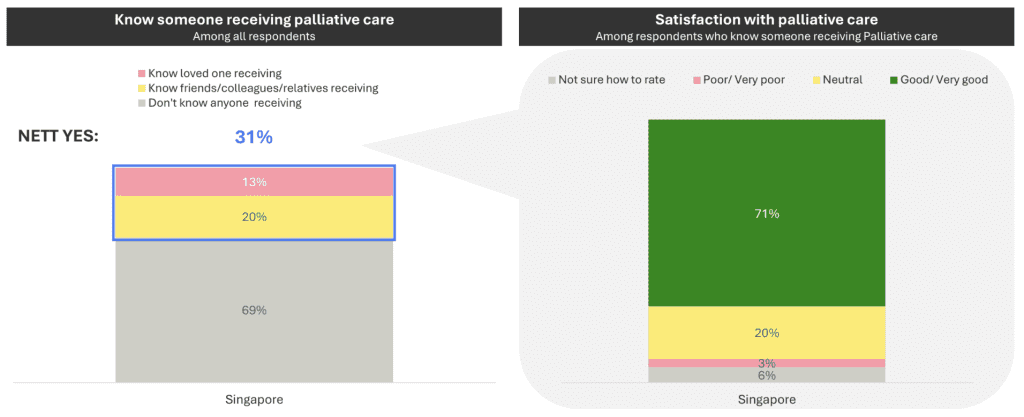Survey Reveals Misconceptions Despite Growing Awareness
A recent survey commissioned by the Lien Foundation, a Singapore-based philanthropic organisation focused on healthcare and elder care issues, has revealed significant gaps in public understanding of palliative care.
Conducted by Kantar, a leading global data and consulting firm, the survey found that while 70% of Singaporeans have heard of palliative care, 39% admit they know little about it.
Misconceptions About Palliative Care Still Common
Despite growing awareness, misconceptions about palliative care in Singapore are proving difficult to shake. Many Singaporeans continue to link palliative care exclusively to end-of-life scenarios, failing to recognise its broader potential in improving the quality of life for patients at any stage of a serious illness.
Among the most common misconceptions were the ideas that palliative care is solely for the dying, that it is restricted to patients in their final six months, and that opting for it means abandoning curative treatments altogether.
These misunderstandings fuel a persistent stigma. “Patients and caregivers may hesitate to seek palliative care because of stigma and the mistaken fear it is akin to giving up on treatment and hope,” explained Mr Lee Poh Wah, CEO of the Lien Foundation.
Read more: New Woodlands Health Campus Enhances Healthcare in Northern Singapore
Late Adoption Limits the Benefits of Palliative Care
While awareness is growing, the survey revealed that palliative care in Singapore is often sought too late. Despite its potential to relieve symptoms and provide emotional support throughout the course of a serious illness, many only consider it at the advanced stages. Over 90% of respondents said they would be likely to accept palliative care for themselves or loved ones—but primarily at the late stage of illness, when pain and distressing symptoms become unbearable.
“People often associate palliative care with care for the dying, overlooking its broader scope to relieve symptoms and enhance quality of life throughout an illness trajectory,” said Mr Lee.
Only about 70% of those diagnosed with early-stage illness said they would consider palliative care, with concerns about costs and a perceived lack of necessity acting as further barriers. This limited adoption means many patients miss out on the full range of support that palliative care can offer, including physical, emotional, and spiritual care, which can significantly improve their quality of life.
Positive Experiences Offer Hope for Change

Despite the persistent stigma, those who have experienced palliative care in Singapore generally report positive outcomes. According to the survey, 31% of respondents knew someone who had received palliative care. Of this group, 71% rated the care their loved ones received as “good” or “extremely good.” These figures suggest that while palliative care remains misunderstood, those who do encounter it often appreciate its benefits.
Additionally, 64% of all respondents found palliative care in Singapore to be moderately or highly accessible, a positive sign in the growing landscape of healthcare support. These experiences highlight the potential for shifting public opinion as more Singaporeans come to recognise that palliative care is not about giving up, but rather, about enriching life through symptom management, emotional support, and improved quality of life.
Call for Early Integration of Palliative Care in Singapore
Experts agree that integrating palliative care earlier in the treatment journey could dramatically improve outcomes for patients. Assoc Prof Alethea Yee, Senior Consultant at the National Cancer Centre Singapore, emphasised the need for a broader understanding of the role palliative care plays.
“If we limit our understanding of palliative care to just end-of-life care, focusing only on the last few days or weeks, we risk missing critical opportunities to address suffering that occurs earlier,” she said.
However, in practice, palliative care in Singapore is often introduced late. According to the survey, the median duration from referral to death is just 22 days, with non-cancer patients receiving even less support. Often only nine days, compared to 33 days for cancer patients. This late referral diminishes the full potential of palliative care to improve the quality of life across the trajectory of an illness.
Read more: Navigating Cancer Care: Oncologists in Singapore
Shifting Perceptions and the Future of Palliative Care
As Singapore works towards better integration of palliative care, public attitudes are slowly starting to shift. The Lien Foundation’s efforts to boost awareness, along with the National Strategy for Palliative Care, are driving changes that aim to make palliative care a routine part of serious illness management, not just a final resort.

Dr Neo Han Yee, Head of Palliative Medicine at Tan Tock Seng Hospital, summed up the ongoing efforts: “Palliative care needs a reshaping of its image. Extending it to patients who may have years left allows us to maximise the value of a multidisciplinary team, helping patients lead engaged and meaningful lives for as long as possible.”

